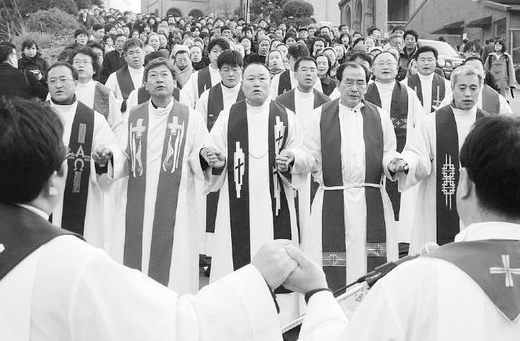S Korean Catholics ask God to stop FTA
Kansas City Star, USA
S. Korean Catholics ask God to stop FTA
By Kelly Olsen, Associated Press
9 March 2007
SEOUL, South Korea — South Korean Catholics on Friday asked God to stop a proposed free trade agreement between their country and the United States, as Washington’s chief negotiator said the two sides were intensifying efforts to strike a deal their legislatures can approve.

About 200 people including priests in white and purple vestments, nuns and farmers prayed for the negotiations to fail at a pre-dusk open air Mass on a sloping hill just below Seoul’s landmark Myeongdong Cathedral.
"Stop it," they shouted repeatedly and in unison after the Mass in a chant typical of South Korean demonstrations against the deal. Their fear is that a treaty slashing trade barriers between the two nations would cost jobs and harm livelihoods.
"If this agreement is concluded Korean farmers and laborers, people ... we will be influenced negatively, economically and culturally from many sides," Kim Sung-hwam, a priest who traveled to the capital from his church in a rural area south of Seoul, said after the Mass.
As bells rang from the cathedral, once a refuge for dissidents and labor activists during South Korea’s days of authoritarian military rule, U.S. and South Korean negotiating teams hunkered down across town at a ritzy hilltop hotel guarded by riot police.
The two sides, which launched the ambitious talks in June, have until the end of this month to wrap up. If they succeed, it will be the biggest such deal for Washington since the North American Free Trade Agreement in 1993.
Seoul and Washington say a deal will boost economic growth between two dynamic economies that already do $72 billion in trade a year. South Korea is the seventh-largest trading partner of the United States.
But Kim said his parishioners, mostly farmers, are worried that they can’t compete with cheaper U.S. products, adding that their incomes will suffer as their goods will fetch lower prices in turn.
"It’s unjust," he said.
At a separate demonstration Friday, about 50 people, mostly affiliated with women’s groups, rallied against the deal near the presidential Blue House in Seoul.
Meanwhile, assistant U.S. Trade Representative Wendy Cutler, Washington’s chief negotiator, said Friday that the two sides were making a final push to reach a politically acceptable agreement.
"Clearly we’re picking up pace in the negotiations," Cutler told reporters, referring to the eighth and final round of talks that began Thursday and are scheduled to conclude Monday.
"We’re just going to have a really intensive time until I leave on Tuesday," she said of meetings with her South Korean counterpart Ambassador Kim Jong-hoon. On Monday she said the five-day talks would be a "decisive week."
After months of haggling, the two sides have only reached agreement in two areas, competition policy and customs affairs. Deals on high-profile areas including trade remedies, automobiles, pharmaceuticals and agriculture remain to be sealed.
"The most important thing is that both Ambassador Kim and I bring home a balanced and comprehensive agreement that can gain National Assembly support and Congressional support," she said, referring to the legislative bodies in South Korea and the United States.
Cutler briefly spoke to reporters at the end of a meeting she held with young South Koreans working for U.S. companies.
The two sides have only about three weeks to clinch a deal if they are to take advantage of U.S. President George W. Bush’s special powers to send trade agreements for submission to Congress for votes without amendments.
The so-called "fast track" authority expires on July 1. Various legal requirements, however, mean an agreement must be completed 90 days before, or by the end of March.
Cutler warned Thursday that Congress won’t approve a deal unless South Korea fully reopens it market to U.S. beef, which was banned for three years over mad cow disease.
South Korea allowed imports of boneless U.S. beef last year. The first three shipments were found to have bone chips, which South Korea fears may harbor the brain-wasting disease that can also affect humans.
The meat was impounded and none has reached South Korean markets or restaurants, resulting in harsh criticism from U.S. lawmakers in cattle-producing states.





